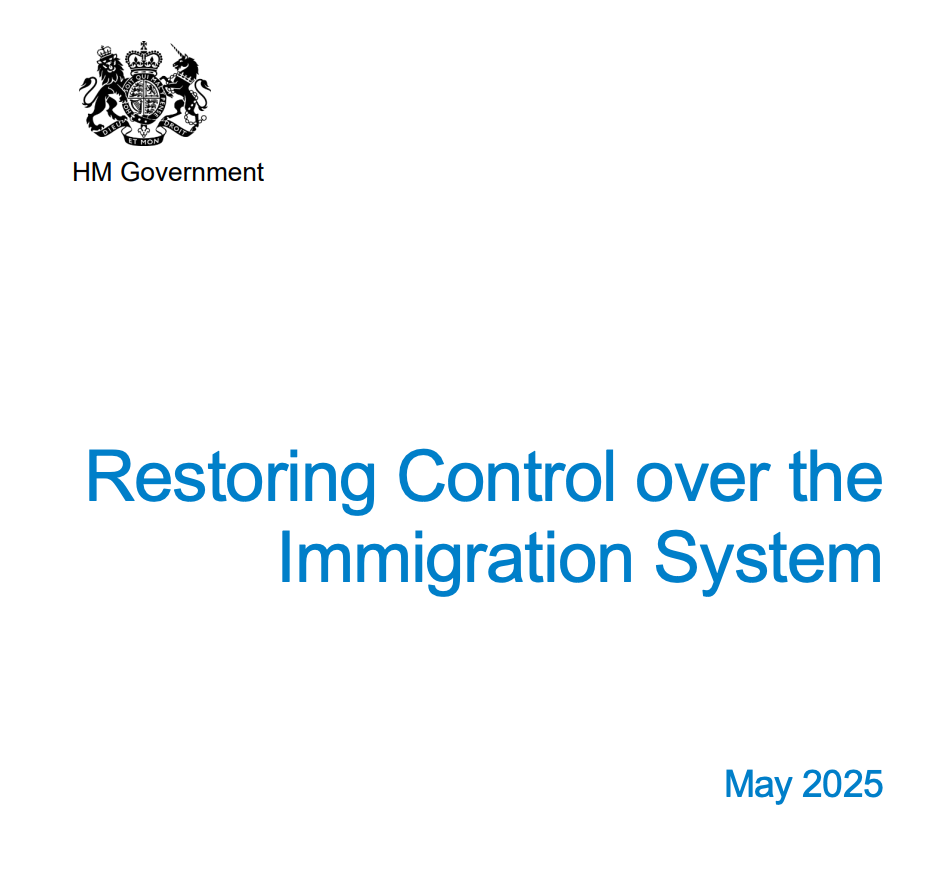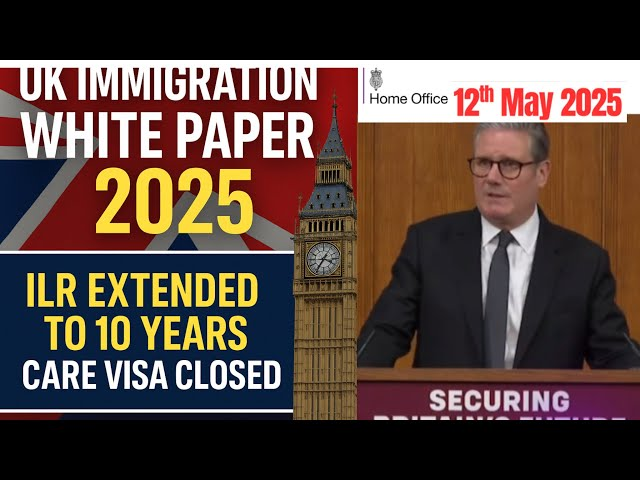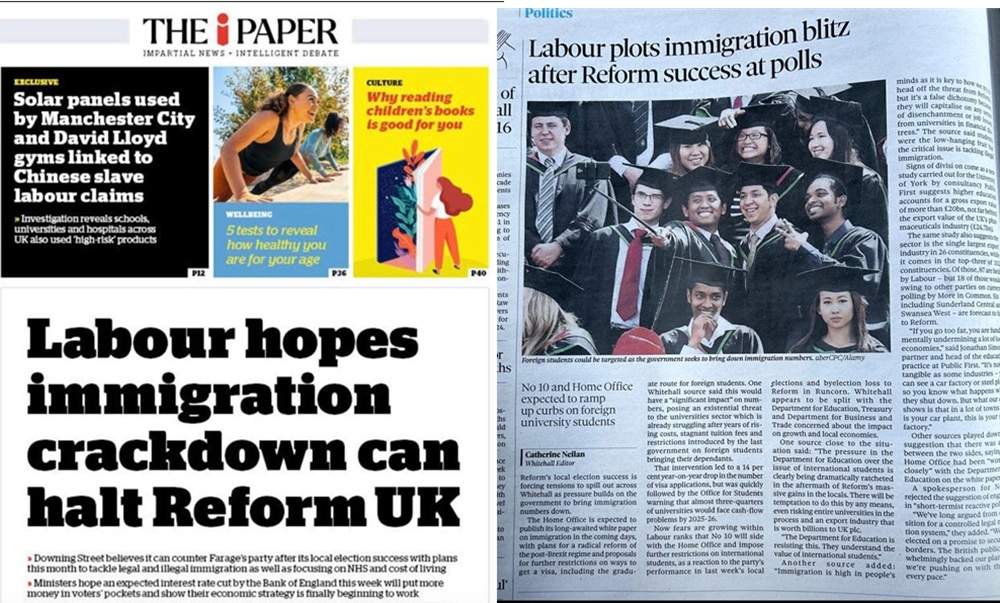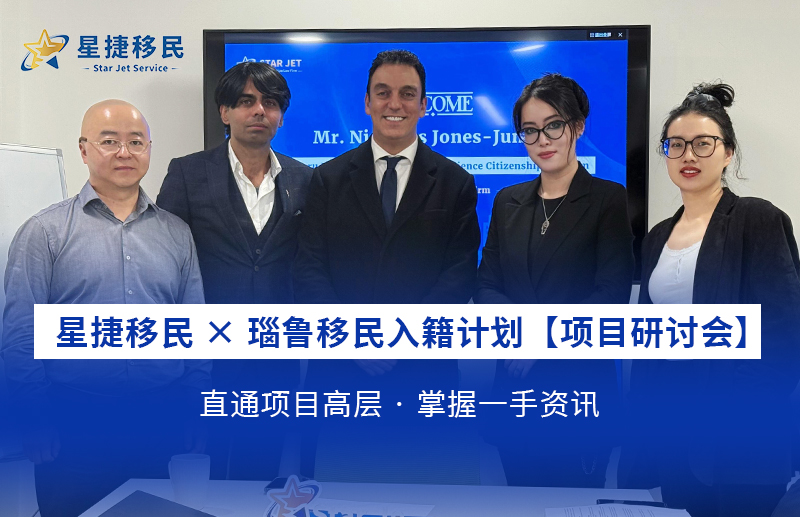Published on: 2025-05-13 ![]() Number of views: 395
Number of views: 395

Today, 12th May 2025, the UK Government released a White Paper outlining proposed immigration reforms that could significantly reshape the system for workers, students, families, and employers. While these changes are not yet law, they offer a clear signal of the Government’s future direction—and it’s important to be ready.
A White Paper is a government document that outlines proposals for changes in policy or law. While it offers a clear direction of the government's intentions, it is not yet law. White Papers are part of the consultation process and open to feedback before the final legislation is drafted and enacted. So, while it’s essential to be aware of these proposed changes, they are still in the discussion phase. There's no need to panic, but it’s wise to stay prepared and plan accordingly, as these changes may influence your future immigration plans.

Why it matters: Many roles currently eligible could become ineligible unless reclassified, significantly curbing the recruitment of overseas talent. The focus for employers would shift toward training and recruiting locally, rather than relying on international hires.
Why it matters: Employers in the care sector will face major hiring restrictions, and prospective applicants may lose a key migration route to the UK. It's also important to note that care workers are already restricted from bringing dependants, except in exceptional circumstances—further limiting the attractiveness of this pathway.
Why it matters: Graduates will have less time to secure skilled jobs or switch visa routes, reducing the overall attractiveness of studying in the UK. This challenge is compounded by the increased salary thresholds under the Skilled Worker route—with further hikes expected, making it even harder for recent graduates to transition into long-term employment.
Why it matters: Universities may pass this cost on to students, impacting affordability and influencing application decisions. This could lead to fewer student visa approvals, as rising tuition fees—on top of already high living costs—create additional financial barriers for international applicants.
Why it matters: This marks a significant shift, as previously only the main applicant was required to meet an English language requirement—dependants were exempt. Introducing a mandatory test for dependants affects family unity and visa eligibility. As passing the English language test is a mandatory requirement, those unprepared for testing could face delays or outright refusal, potentially disrupting family plans.
Why it matters: Students must carefully research sponsor reliability, as losing sponsorship could result in visa curtailment.
Why it matters: This extends the timeline and cost for long-term migrants seeking permanent residence and citizenship.

Understanding the real-world impact of these proposed immigration reforms is significant for anyone intending to work, study, or settle in the UK. This requires going beyond surface-level analysis. Below is a breakdown of who is most affected, what they need to keep in mind, and the common pitfalls and risks they should be aware of.
This is especially relevant for those in non-graduate-level occupations (below RQF Level 6) or for workers with dependants. It’s important to note that jobs currently eligible for the Skilled Worker visa may soon become ineligible unless they are reclassified or specifically exempted. This is crucial for employers looking to recruit overseas workers to come to the UK, as well as for prospective Skilled Workers with dependants. Moreover, Certain occupations may be permitted without the right to bring dependants, limiting suitability for families.
Common pitfalls:
Professional tip: Consider fast-tracking sponsorship while existing criteria still apply and monitor your role’s classification closely.
Keep in mind:
The Graduate Route is proposed to be shortened to 18 months, giving graduates less time to secure a sponsored job. A new levy on tuition fees could increase costs, especially for self-funded students. Universities that don’t meet stricter compliance standards may lose their ability to sponsor student visas, which could affect the validity of student visas.
Common Pitfalls:
Professional tip: Select highly compliant universities and begin job-seeking and visa planning well before graduation.
Keep in mind:
English language testing (A1 level) will be required for all adult dependants, aligning with the spousal/partner route and failure to meet this new requirement could result in refusal or delay of the dependant visa, impacting family unity.
Common Pitfalls:
Professional tip: Begin English preparation well in advance of your application and confirm which test providers are Home Office approved.
Keep in mind:
Many roles, especially below RQF Level 6, are likely to become ineligible unless reclassified through a government assessment process. Furthermore, employers may need to evidence domestic recruitment strategies before accessing international talent for lower-skilled roles.
Common Pitfalls:
Professional tip: Conduct an internal audit of all sponsored roles and ensure the Cos is assigned on the basis of updated Occupation codes and salary is updated accordingly.
Keep in mind:
The proposed extension of the qualifying period for settlement to 10 years will significantly affect long-term planning for both individuals. This longer wait to apply for permanent residency could disrupt career and personal plans. Additionally, the need for more frequent visa renewals, rising costs, and increased paperwork will become the norm, creating ongoing financial and administrative burdens. Employers may also have to manage extended compliance requirements, adding administrative tasks for maintaining sponsorships and ensuring checks on their workers confirming their compliance with immigration regulations.
Common Pitfalls:
Professional tip: Review whether accelerated routes such as Long Residence, Global Talent, or family-based pathways offer more certainty and cost-effectiveness in your case based on your eligibility.

Stay Informed: Keep track of these proposed changes by subscribing to updates from trusted immigration sources (or follow us for the latest insights).
Apply Promptly: If you qualify under current regulations, submit your applications before the new rules take effect.
Prepare for English Tests: Both main applicants and dependants should begin preparing for English language tests now to avoid last-minute rushes.
Plan for Long-Term Settlement: Consider how the potential 10-year wait for settlement could impact your plans and factor this into your visa choices.
Seek Expert Advice: With immigration rules evolving rapidly, consulting with an expert can save you time, money, and stress in navigating these changes.
At Star Jet Immigration Law Firm, we are committed to staying ahead of the curve. Our team of experienced immigration caseworkers continuously monitors any proposed changes in immigration policy, ensuring we can provide you with the most up-to-date advice. Whether you are concerned about the potential impact of these reforms or need assistance with your visa application, we offer tailored solutions to meet your specific needs.
Should you face any risk of ineligibility, we also provide strategic fall-back options to ensure your plans stay on track. With our expertise and commitment to your success, you can trust us to navigate the complexities of immigration law with confidence.
Book a consultation today and let us help you navigate the proposed changes with confidence.

 285
285As an officially authorized agent of Nauru, Speeder Immigration held an official meeting with Mr. Nicholas, Strategic Relations Manager of the “Nauru Economic and Climate Resilience Citizenship Program,” at our Manchester office in the UK.

 704
704On 22 July 2025, the UK government introduced new immigration rules that reshape the Skilled Worker visa pathway. For entrepreneurs and business owners considering the self-sponsored Skilled Worker visa route, the door remains open — but the requirements have become more selective.

 356
356In the heart of the Pacific Ocean lies Nauru, a small and peaceful island nation with a warm community and a history that once thrived on valuable phosphate resources. Today, Nauru is focused on a new chapter — one built on sustainable development, climate resilience, and economic growth. Through the Nauru Economic and Climate Resilience Citizenship Program, successful applicants can secure a safe second citizenship while directly contributing to the country’s infrastructure and environmental initiatives.

 469
469British citizenship is a privilege, not a right—and one of the biggest hurdles applicants face is proving they are of good character. Many applicants believe that if they have indefinite leave to remain, a long residence history, or no current issues, they will automatically qualify. But the reality is more complex.
Is the immigration process complicated? Don’t worry! Xingjie Immigration’s exclusive planner will tailor a personalized plan for you!

We offer free consultations to assess your needs and provide you with an opportunity to experience the high-quality service that Star Jet provides.

Our services are fully transparent, keeping you updated on progress at all times.

With our multi-to-one service model, we aim to achieve satisfactory results in the shortest possible time.

Strict confidentiality of client data is always guaranteed, with data encrypted and securely stored.

+44-7596688888
(Emergency contract number)

admin@starjetimmigration.com
Birmingham Office
Second Floor,
White House,
111 New Street,
Birmingham
B2 4EU
 0121 517 1168
0121 517 1168
 0795 668 8888
0795 668 8888
Manchester Office
St James Tower,
7 Charlotte St,
Manchester
M1 4DZ
 0161 521 9800
0161 521 9800
 0795 668 8888
0795 668 8888
Star Jet Service Ltd is an immigration law firm approved by the UK’s Immigration Advice Authority (IAA: F202331612), with offices in Birmingham and Manchester in the UK, as well as in China. Our team of highly experienced immigration lawyers provides services for the UK and other countries. Each core member of the firm has many years of industry experience, and we are committed to delivering efficient, high-quality services to clients from diverse backgrounds.All immigration lawyers and key personnel at Star Jet are based in the UK, ensuring the utmost privacy for our clients. In addition, we have dedicated Education and Property Departments, offering comprehensive, one-stop solutions to meet a wide range of client needs.
Star Jet Service Ltd is a company registered in England and Wales. Registration number: 12300174. Registered office: Second Floor, White House, 111 New Street, Birmingham B2 4EU.
Star Jet Service Ltd, trading as Star Jet Immigration Law Firm, formerly Duber Service, incorporated under the laws of England & Wales since November 2019. Star Jet Immigration Law Firm is authorised to provide immigration advice and services by the IAA.
Authorised and regulated by the IAA under number F202331612. VAT registration number: 426 4335 06.
©️2025 Star Jet Service Ltd | Privacy Policy